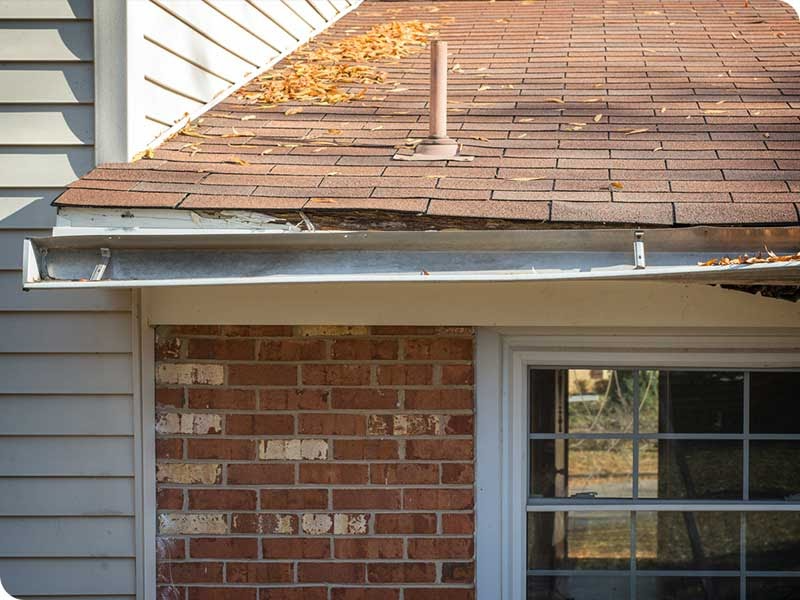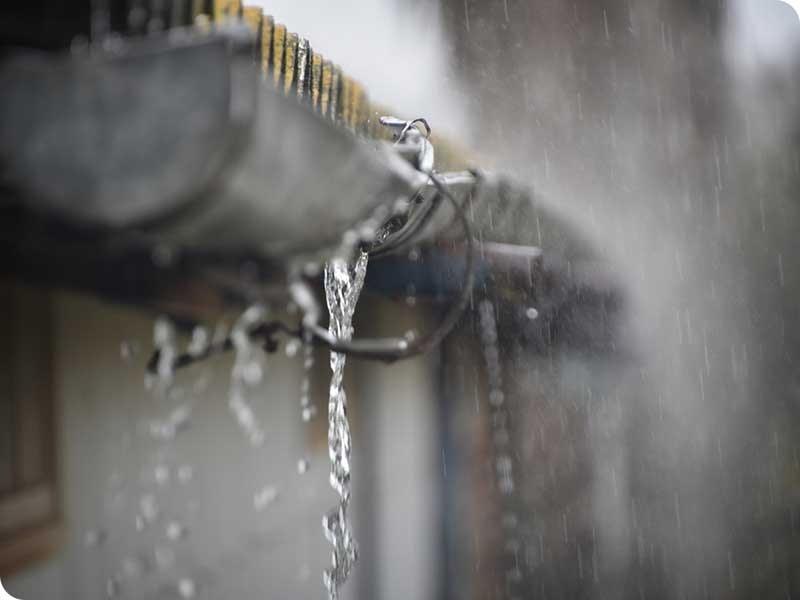
Your seamless gutters help keep your home safe from water damage. They stop rainwater from building up in your roof, preventing problems like early shingle deterioration, rot and mold growth. Your gutter system is also essential in keeping your foundation and landscaping in good shape.

Gutters can start separating from your house for various reasons. It is crucial to address sagging gutters immediately before they start causing water-related problems to different parts of your home. Keep reading to learn the signs you’re dealing with this issue.
What Usually Causes Gutters to Sag?

Natural Wear and Tear
Like any part of the house, gutters also naturally deteriorate as they age. As your gutter system ages, it is more likely to warp and sag. How quickly it ages depends on several factors, such as the material it’s made from, your local climate and the quality and frequency of maintenance the system has received over the years.
Certain materials are more prone to contraction and expansion due to temperature changes. Repeated cycles of this movement can lead to warping. Some manufacturers apply non-corrosive coatings to aluminum gutters to prevent this issue. Warping can also alter the shape of your gutters and cause the system to sag.
Clogging
Over time, leaves, twigs, seeds and other debris can accumulate in your gutters. When left to gather, they will eventually cause clogs. Once your gutters clog, they will no longer be able to do their job. Water will back up to your roof and drip down to the rest of your home’s exterior. When this happens, you could end up dealing with water damage, basement flooding, compromised foundation and eroded landscaping.
The weight of water and debris will also cause your gutters to start separating from your house. Luckily, you can easily avoid these costly issues with regular gutter cleaning and maintenance. Another thing that can help is to invest in a quality gutter protection system.
Loose Gutter Spikes
One more common reason gutters sag is due to loose spikes. If this is the case, you will need to have the gutters put back in place with new hardware. In some cases, adding hangers between existing spikes can fix the issue. To catch the problem early, inspect your gutters every few months to see if there are loose gutter spikes.
A skilled gutter installer will use hidden hangers instead of spikes for attaching gutters. While gutter spikes tend to get loose over time, hidden hangers are screwed in, providing better support and protection.
Improper Installation
Poorly installed gutters are more likely to get loose or sag. An experienced gutter installation contractor knows how to place gutter hangers for even weight distribution. They will also make sure to align gutters correctly to prevent standing water. When improperly aligned or sloped, water will not drain properly. The water buildup can strain your gutters and cause them to sag.
How Can You Tell If You’re Dealing With This Issue?

Your Gutters Are Leaning
If your gutters are leaning away from your home, they are loose. This issue is usually pretty obvious to see just from observing your home from the outside. Be sure to deal with the problem immediately because it will only get worse if left unattended and could result in your gutters completely detaching.
Gutters tend to lean when the fascia board has water damage and isn’t strong enough to hold them anymore. It would be useless to secure gutters back to a deteriorating fascia board because the problem will eventually occur again. You need to deal with the root cause of the problem first to ensure it doesn’t recur.
The Fascia Board Is Rotting
Your gutters protect wooden parts of your home, including the fascia board. Loose gutters can cause fascia rot, but a rotting fascia board can loosen gutters. When gutters are loose, your fascia board will be left exposed to water, causing it to rot. On the other hand, a rotting fascia board will fail to support gutters, causing them to detach from your house slowly.

There’s Water Going Behind Your Gutters
You don’t want water behind your gutters because it can rot the wooden components of your home. Check if there are gaps between your gutters and the fascia board. You should contact a gutter repair professional if you can see the sky between the fascia board and your gutter system. Do the same if water stains are present on the siding or brick under your gutters. Professionals will tighten up the space to prevent rotting in the fascia board that can loosen gutters from your home.
Your Gutters Are Loose
Have you noticed that some parts of your gutters are sagging or bowing down? If so, it could be that they need to be re-attached with new hangers. There should be no gap between the wall and your gutters. Again, a space in this area means that you have loose gutters that require immediate attention.
You’re Seeing Loose Gutter Screws
Often called gutter nails or gutter screws, spikes are the big nails used to mount gutters into the rafters of the fascia board. You can easily see loose gutter spikes from the ground, and they can be tightened by hammering or screwing. However, this is unlikely to be a permanent solution. The repeated hammering and screwing will cause the holes to get bigger. As a result, they won’t give a grip anymore.
You must also look out for rusting screws or nails. You’ll know gutter spikes have rust if there are brown marks or lines from where they are attached to. Have any rusting hardware immediately because they can fail anytime, which isn’t safe for you and your home.
How Do You Avoid This Issue?

Choose the Right Gutters for Your Home
Your gutters will sag if they aren’t the right size and material for your home. They should be able to handle the added weight of water and debris carried by rainwater. Standard gutter systems are around 5 inches long and 6 inches wide. Meanwhile, standard downspouts are 2×3 inches or 4×3 inches in length and width and have a diameter of 3 or 4 inches.
Keep in mind that standard gutter and downspout sizing doesn’t work for all homes. When choosing gutters, you need consider how much rainfall your area typically receives. You should select a material suitable for your climate. The more steeply your roof is sloped, the quicker the water will flow down, and the larger gutters you need. At Barry Best Seamless Gutters, we will help you choose the right gutter size and style for your home. We also install quality heated gutter systems, helping you prevent ice and snow buildup that can be damaging to your roof.
Make Sure Your Gutters Have a Good Support System
While gutter spikes cost less than other types of gutter hangers, they tend to become loose over time. This is because they are made of metal, which expands and contracts with temperature changes. Half-round gutters usually have brackets and straps that provide good support. They are secured to gutters in a manner that prevents thermal movement. Then there are hidden hangers that are screwed to the fascia board from inside the gutters. It offers superior support and will benefit your curb appeal since they are not noticeable.
Work With a Reliable Gutter Installation Company
The best way to avoid different gutter problems is to invest in a dependable contractor. It’s never a good idea to attempt gutter installation and repairs on your own. An experienced professional will know which type of gutters works best for you and your climate. They will know which hangers to use to provide sufficient support for the system.





